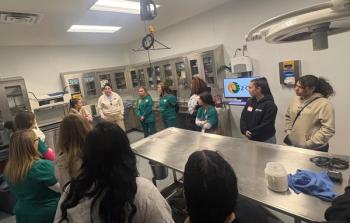
Signs of canine frustration
A new series of questions for veterinary clients could shed a light on a particular dogs tendencies to get peeved when expectations are subverted.
Traffic's been terrible with all this rain today, Sharon. So yes. I'm a little frustrated. (encierro/stock.adobe.com)
When you expect something to happen and it doesn't, you can get frustrated. Now, UK researchers have developed a new psychometric tool, a canine frustration questionnaire, that tries to grasp how frustrated-or generally able to be frustrated-a particular dog is.
What they did
Researchers from the University of Lincoln, University of Leeds and a London humane society asked pet owners via social media and personal contacts to answer questions about the tendencies of their dogs to experience the following types of frustration:
- General frustration, displaying signs of frustration regularly and in various aspects of their daily life
- Barrier frustration/perseverance, persevering in trying to achieve a specific goal, despite the presence of a physical barrier and when, at such a time, an owner may find them difficult to distract/interrupt
- Unmet expectations, struggling to cope in situations where an expectation is not met, such as a routine change (absent or delayed reward)
- Autonomous control, displaying problems (which may include aggressive behaviors) when there is a loss of freedom to act independently (due to restraint or confinement) and when there are threats to resources such as territory, food, or toys
- Frustration coping, struggling to relax and settle when faced with a situation in which they cannot achieve their goal.
Respondents mostly in the United Kingdom and United States were asked to complete the
What they found
Twenty-one of the 33 items listed in the questionnaire were reliable enough to be added to the five categories or principal components of canine frustration above.
“There was a significant positive correlation between each principal component and the dog owners' general perception of their dogs' frustration tendencies, alongside other expected correlates,” wrote the researchers in
The researchers concluded that the Canine Frustration Questionnaire (CFQ) can be considered a robust tool to measure frustration tendencies in dogs.
“The introduction of the CFQ into clinical behavior practice will enable not only the identification of dogs with frustration tendencies, but also the future evaluation of interventions to specifically manage such problems,” the researchers wrote. “Further validation of the tool with behavioral and physiological correlates is underway to increase confidence in this previously neglected area.”
Take-home message
Speculating on current and future clinical relevance of the CFQ, the researchers imagined some possible interventions that might come with each of the five principal components of frustration seen in canine patients.
“Our biological interpretation of each component facilitates predictions concerning the behavior and management of dogs scoring more highly within one domain,” they wrote. “These should be considered hypotheses for consideration that can be tested through clinical intervention, and future work should aim to provide more empirical evidence in relation to these proposals.” The authors offered some very rudimentary ideas for interventions for dogs with high scores for particular frustration components, mostly citing a 2012 book titled
- Dogs struggling with “general frustration” might benefit from interventions that focus on the development of general frustration tolerance. Also, dogs experiencing irritability and moodiness of this nature might be in chronic pain. “Many
chronic painful conditions manifesting as behavioral problems go unrecognized,” the researchers noted.
- Dogs struggling with “barrier frustration/perseverance” might benefit from interventions focused on building tolerance around a gradient of barriers.
- Dogs struggling with “unmet expectations” might benefit from interventions focused on creating positive associations with change.
- Dogs struggling with a need for “autonomous control” might benefit from interventions intended to form positive associations with restraint, handling, confinement and approach when in possession of resources.
- Dogs struggling with “frustration coping” might benefit from interventions focused on teaching them how to cope with such disappointments.
Newsletter
From exam room tips to practice management insights, get trusted veterinary news delivered straight to your inbox—subscribe to dvm360.






